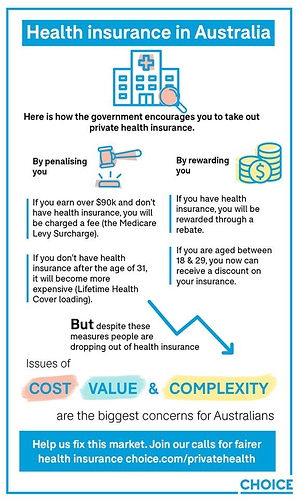A bottom line to health debate is whether healthcare is a human right, a right of citizenship, or a privilege.
While it could be seen as an idealistic human right, that is impractical because the global population would inundate any health infrastructure to the point of collapse.
As a right of citizenship those receiving care are paying for it through taxation, and the level of taxation to fund health care is a discussion, especially as our collective needs rise. Lower taxes and potentially a shorter lifetime due to lesser care makes sense to some but not to others. What is the value, price, and cost of prolonging life - an ethical and for some a religious issue.
Healthcare as a privilege? Those with sufficient wealth are able to buy whatever healthcare they need when they need it, and it has been so virtually forever and is not going to change. Eliminate the private system and the wealthy will go to another country for treatment if they want or need to. Complicating some of privileged treatment is the reality our system has put emergency care into the public trauma centres and the private system has very few emergency capabilities. That can be changed by legislation but should that happen by stealth, at all, or eventually by public support. If that happened we could learn about the US system where everything is user pays or charity.
Fall off a ladder and break your back in the US, or have a heart attack, or ruptured appendix, or [pick anything] - ambulance $$$ and when carried into the to ER, first questions are about one’s insurance or ability to pay, often with a credit card guarantee put on file. A late rellie in the US was a ‘sick puppy’ for many years and often spent 3-5 days in hospital at a time, and each episode was billed around $100,000. Two obvious questions, one being how 3-5 days of anything can cost $100,000, and how the business model for health insurance has to operate to pay such exorbitant amounts. In reality they negotiate with specific providers who take FAR LESS than the billed amount as full payment in return for the volume the insurance companies send their way. It is primarily about accountants and contracts. Our health funds with ‘network providers’ already operate under that business model.
The US system that the NIB CEO aspires to emulate puts accountants in charge, and the historic charitable system in the US requires hospitals to stabilise emergency patients but then allows private facilities to essentially dump uninsured/charity onto the streets to fend for themselves or literally dump them onto the few public hospitals, who likewise do their best to discharge them…
Since we have a coalition government, it pays to read the Liberal platform about Medicare. It reads well but the underlying message seems more about $$$$ than healthcare. The PM has reiterated this government is behind Medicare, but does not detail what that means in a long term practical sense. The Liberal party is seems to be a right-libertarian party in practice, and the left-libertarians (aka small ‘l’ Liberals) have seemingly been marginalised, to make the point. For balance a faction in the ALP seems to reflect left-libertarian ideals that creates tensions with liberal (progressive) ideals so little is clear at the political level.
Depending on how one perceives healthcare the ‘fix’ for private health insurance will vary dramatically, and often be tainted by political spin as well as point scoring. Each of us needs to read and understand what the words mean behind the claims, including what is unsaid as well as what is put in our faces by the vested interests and ‘their pollies’.


